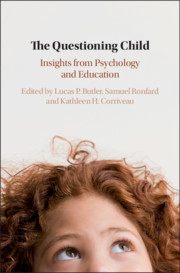Book contents
- The Questioning Child
- The Questioning Child
- Copyright page
- Dedication
- Contents
- Figures
- Tables
- Contributors
- 1 Questions about Questions
- 2 Questions in Development
- 3 The Point, the Shrug, and the Question of Clarification
- 4 The Quest for Comprehension and Learning
- 5 Children’s Question-Asking across Cultural Communities
- 6 The Development of Information-Requesting Gestures in Infancy and Their Role in Shaping Learning Outcomes
- 7 Developmental Changes in Question-Asking
- 8 Understanding Developmental and Individual Differences in the Process of Inquiry during the Preschool Years
- 9 “Why Are There Big Squares and Little Squares?”
- 10 Children’s Questions in Social and Cultural Perspective
- 11 Mothers’ Use of Questions and Children’s Learning and Language Development
- 12 Teaching and Learning by Questioning
- 13 Asking “Why?” and “What If?”
- 14 What Makes a Good Question? Towards an Epistemic Classification
- 15 The Questioning Child
- Index
- References
1 - Questions about Questions
Framing the Key Issues
Published online by Cambridge University Press: 10 January 2020
- The Questioning Child
- The Questioning Child
- Copyright page
- Dedication
- Contents
- Figures
- Tables
- Contributors
- 1 Questions about Questions
- 2 Questions in Development
- 3 The Point, the Shrug, and the Question of Clarification
- 4 The Quest for Comprehension and Learning
- 5 Children’s Question-Asking across Cultural Communities
- 6 The Development of Information-Requesting Gestures in Infancy and Their Role in Shaping Learning Outcomes
- 7 Developmental Changes in Question-Asking
- 8 Understanding Developmental and Individual Differences in the Process of Inquiry during the Preschool Years
- 9 “Why Are There Big Squares and Little Squares?”
- 10 Children’s Questions in Social and Cultural Perspective
- 11 Mothers’ Use of Questions and Children’s Learning and Language Development
- 12 Teaching and Learning by Questioning
- 13 Asking “Why?” and “What If?”
- 14 What Makes a Good Question? Towards an Epistemic Classification
- 15 The Questioning Child
- Index
- References
Summary
In this introductory chapter, we outline three broad questions of interest to researchers and educators, each of which provides a clear thread throughout the volume. First, where do questions come from, and how do children engage in questioning across development? Second, to what extent is questioning universal, and in what ways is it socialized? Third, what role does question-asking play in learning more broadly, in both formal and informal environments?
- Type
- Chapter
- Information
- The Questioning ChildInsights from Psychology and Education, pp. 1 - 5Publisher: Cambridge University PressPrint publication year: 2020
References
- 1
- Cited by

